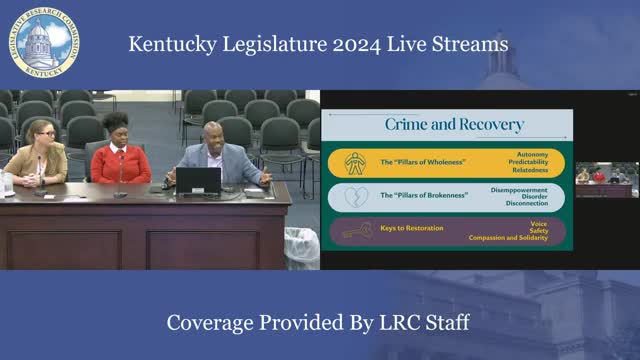Crime steals more than property it robs autonomy
June 22, 2024 | Department of Juvenile Justice, Justice, Governor's Secretary of the Cabinet, Organizations , Executive, Kentucky

This article was created by AI summarizing key points discussed. AI makes mistakes, so for full details and context, please refer to the video of the full meeting. Please report any errors so we can fix them. Report an error »

In a recent government meeting, officials discussed the profound psychological impact of crime on individuals and communities, emphasizing the importance of autonomy, predictability, and relatedness in daily life. The speaker highlighted how these elements contribute to a sense of safety and well-being, noting that when individuals experience crime, such as theft, it disrupts not only their property but also their personal autonomy.
The discussion illustrated how everyday choices—like deciding how to commute or which grocery store to visit—are often taken for granted. These choices foster a sense of control and predictability in life. However, when a crime occurs, such as a car theft, it can lead to feelings of violation and loss of autonomy. The speaker recounted a case involving a single father whose car was stolen, stressing that his immediate concern was not just the loss of the vehicle but the impact on his ability to care for his daughter.
This meeting underscored the broader implications of crime beyond material loss, highlighting the psychological toll it takes on victims and the community's sense of stability. The officials called for a deeper understanding of these dynamics to inform policies aimed at enhancing community safety and support for victims.
The discussion illustrated how everyday choices—like deciding how to commute or which grocery store to visit—are often taken for granted. These choices foster a sense of control and predictability in life. However, when a crime occurs, such as a car theft, it can lead to feelings of violation and loss of autonomy. The speaker recounted a case involving a single father whose car was stolen, stressing that his immediate concern was not just the loss of the vehicle but the impact on his ability to care for his daughter.
This meeting underscored the broader implications of crime beyond material loss, highlighting the psychological toll it takes on victims and the community's sense of stability. The officials called for a deeper understanding of these dynamics to inform policies aimed at enhancing community safety and support for victims.
View full meeting
This article is based on a recent meeting—watch the full video and explore the complete transcript for deeper insights into the discussion.
View full meeting
